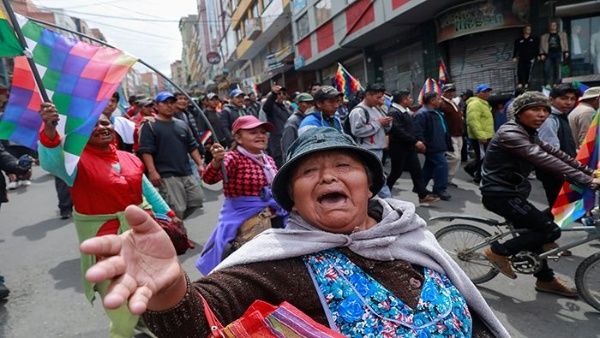

Bolivians, carrying whipalas, protest U.S.-back coup
Published Nov. 13 on Telesur. Translation by John Catalinotto.
“Welcome to the dictatorship,” said one woman as she ran from tear gas, motorcycles, vans holding young people arrested, and military tanks. The scene took place in the center of the city of La Paz in the afternoon of [Wednesday], Nov. 13, after the president of the Senate, Adriana Salvatierra, had been detained and the self-proclaimed president, Jeanine Añez, had appointed a new military chief.


Bolivians, carrying whipalas, protest U.S.-back coup
Events are happening at dizzying speed in Bolivia. The bloc carrying out the coup d’état has a series of steps to take and carries them forward. Añez’s self-proclamation, gospel in hand and with the tricolor sash put on her by the Bolivian Armed Forces, was one of them. This Wednesday, Nov. 13, The next one took place, that of creating a fictional government — that is to say, putting someone in position to give orders.
These steps have a paradox: While [the coup-makers] try to make it appear that there is a new government following laws, the unconstitutional way in which they do it shows the magnitude of the coup d’état. Not only for analysts, parties and diplomats, but for a part of the population that sees the self-proclamation as something impossible to justify democratically.
That situation was reflected in the uprising in the city of El Alto that began on Monday, Nov. 11, which this Wednesday became a massive town meeting and then descended in a unified manner to La Paz. The number of people mobilized [in resistance to the coup] is increasing daily, and their radicalism is being consolidated.
The situation in this key area of Bolivian history and political dynamics graphs the tensions and unity. On the one hand, the mobilizations [of resistance to the coup] have two indisputable points of unity: the defense of whipala [Indigenous flag] that was trampled by the coup-plotters — “it is the revolution of the whipalas,” said an Aymara [Indigenous] leader — and on the other side [the self-appointed President] Añez, who has made anti-Indigenous statements, with her illegal presidency.
On the other hand, [within the resistance] there is a point of debate: the return of Evo Morales. One sector chants it, demands it and fights to make it a reality, while another affirms that it does not belong to the Movement Toward Socialism (MAS) –“We are not Masists,” they say. But it is clear [the resistance] must confront a coup d’état that does not distinguish between those who are Masists and those who aren’t, and that pursues, represses and murders equally.
Police violence fuels resistance
This situation seems to be in an upward spiral where police violence fuels the uprising. There have already been two deaths in El Alto — possibly three — and the prolonged repression, for hours this Wednesday, strengthens the already clear separation: El Alto, the whipala, the Indigenous nations against the coup d’état led by those who despise and humiliate them.
The coup leadership is trying to send messages addressing and defusing this confrontation, such as placing whipalas on top of military tanks, or broadcasting videos of Fernando Camacho — the main civilian and business face of the coup — and Añez in which they claim to be united and respect diversity and the whipala.
These messages have failed to produce the desired effect. The establishment of a process of resistance is advancing, not only in El Alto, but also in rural areas, with local mobilizations, in highways, cities and other places that converge toward the city of La Paz, where the [Indigenous peoples’ militia] Ponchos Rojos arrived on Wednesday. Will a siege of La Paz take place? It is one of the main fears experienced at this hour.
Fear is precisely what motivates many of those who support the coup and celebrate it. They organize in their blocks of middle-class and wealthy areas to defend themselves from what they present as the invasions of El Alto and the Indigenous peoples.
Fear and revenge are two of the engines that move the coup. The overthrow of Morales has several objectives, among which is to return the country to the ruling classes: that of a Bolivia governed by them and for them.
They are advancing toward that objective, and on Wednesday night eleven ministers of the new cabinet were appointed after the repression and the news of the dead. According to several newspapers, there were two deaths: one in Montero and another in Yapacaní, in the department of Santa Cruz.
The news of repression, persecution, arrests, gunfire against demonstrators are multiplied in social networks, but speed, censorship, the rupture of the rule of law and the lack of government open an area of impunity that seems to have no limits. Who has commanded the Bolivian Armed Forces until tonight? Who commands the right-wing armed groups that have lists of Masists to be assassinated?
The process of consolidation of the coup is advancing in its steps and has international backing. In addition to the U.S. government and the secretary of the Organization of American States Luis Almagro, the Colombian government backed the coup, and the high representative of European Union foreign policy Federica Mogherini supported the appointment of Añez as interim president.
As part of Workers World newspaper’s coverage marking the 50th anniversary of the liberation of…
From the PFLP Central Media Office The following statement from the Popular Front for the…
Newark, New Jersey Over 250 people, representing over 250 New Jersey endorsing community groups, attended…
Special to Workers World The following is a press release issued on April 24, 2025,…
dear Larry Krasner, we heard you sued Elon Musk over his corrupt million election giveaways…
Unions join forces against harassment and deportation of members When 200 immigrant workers – from…